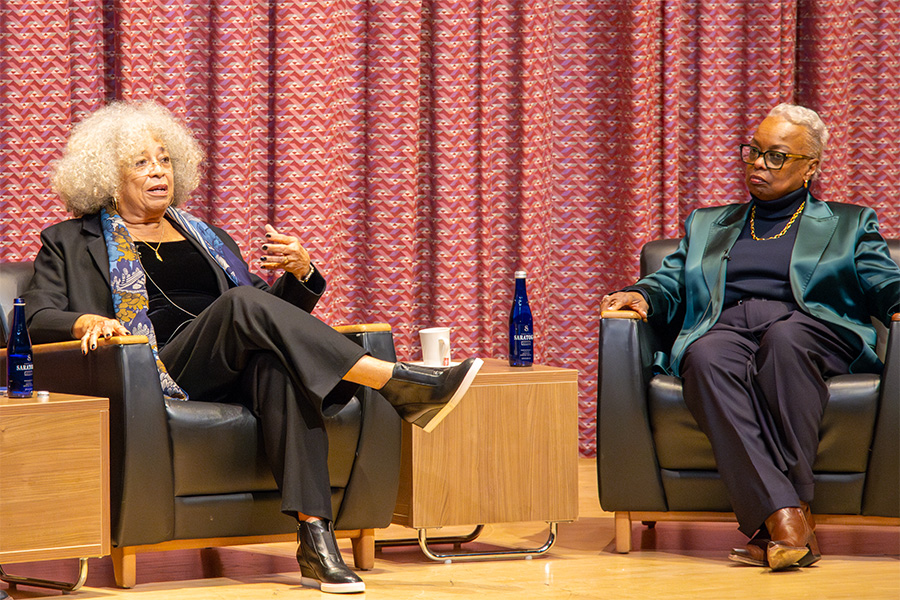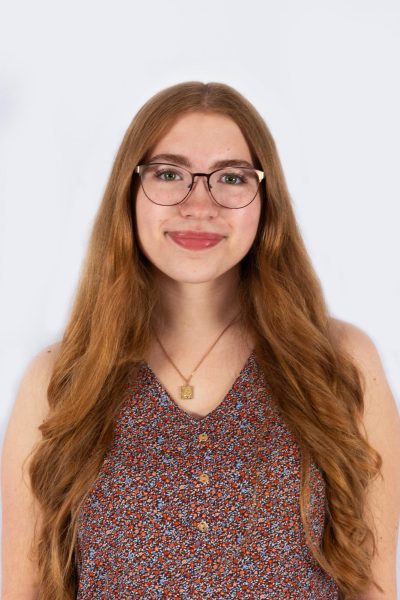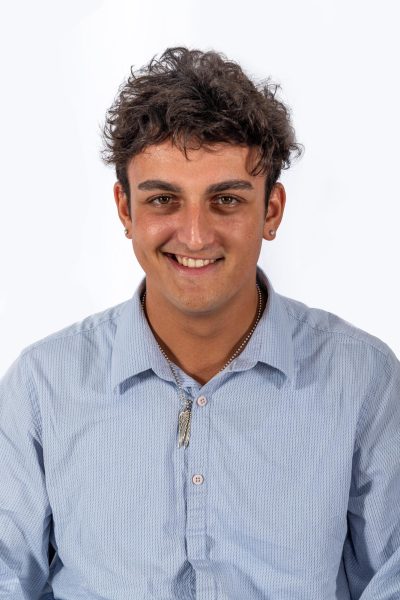Angela Davis –– an author, political activist and professor –– spoke Feb. 4 in Ford Hall for a conversation event titled, “We Are Because They Were: An Evening with a Living Ancestor.” Over 600 people filled the concert hall and over 700 people watched the livestream.
Davis has been a member of the Communist Party of the United States of America and the Black Panther Party. In her work as a professor at the University of California, Santa Cruz, she teaches courses on the history of consciousness and feminist studies. She has written many books including, “Angela Davis: An Autobiography” and “Abolition. Feminism. Now.”
Omar Stoute –– director for Staff Equity, Inclusion, and Belonging –– gave the opening remarks. Stoute said that when he was younger, his dad would read books by Black thinkers and revolutionaries like James Baldwin, Marcus Garvey, Martin Luther King and Angela Davis.
“I didn’t know when that moment would come when I would care about others more than I cared about myself,” Stoute said. “It didn’t happen until much later in my life, but I know the seeds were planted when I was six. So I really hope today is some seed planting for you all.”
Lauren Kelly Benson, director of the Office of Religious and Spiritual Life, led the Q&A with Davis. They inquired about Davis’ motivations for coming to speak at Ithaca College, especially after already giving a lecture at Cornell University the night prior.
“Well, first of all, teaching is my passion,” Davis said. “I really appreciate engaging with younger people. … Teachers can’t be good teachers unless they are lifelong students, so I consider [these events] part of my ongoing education as well. Besides, I’ve always loved Ithaca College.”
Benson opened the formal questioning section with a question by Grace Lee Boggs, author and activist. Boggs is known for asking the question, “What time is it on the clock of the world?” in her book that she wrote with her husband James Boggs, “Revolution and Evolution in the Twentieth Century.” They visualized 3,000 years of human history on a 12 hour clock where every minute represents 50 years. According to Left Turn, the Boggs’ then theorized that “revolution as the primary driver of social change is only 5 minutes old.” Benson asked Davis what time she thinks it is on the “clock of the world.”
Davis said that there was no easy answer but that the next four years will be formative and much will change. However, she said it is only four years and much of deciding where we are on this world clock must be decided by society collectively.
“It’s our own action that helps to move the hands of the clock to a certain place,” Davis said. “And I would say now, things are very unstable. I want us to think about what we might do to be able to determine the time … to guarantee that the hands of the clock are in the right place.”
Benson and Davis then discussed the concept of abolition. Abolition is a theme in Davis’ writings, even making its way into multiple book titles, such as “Abolition: Politics, Practices, Promises Vol. 1,” “Abolition Democracy: Beyond Empire, Prisons, and Torture” and “Abolition. Feminism. Now.” Davis has been a longtime supporter for prison abolition, but also spoke about abolition in other forms.
Davis said the abolition of singular institutions will not solve larger societal issues. She referenced how the abolition of slavery did not stop systemic racism and inequality. Davis also spoke about abolition in the form of anticapitalism, referring to the billionaire class and its relation to government.
“[Abolition] is a mandate against capitalism,” Davis said. “That’s especially important given who’s really pulling the strings right now.”
At the inauguration of President Donald Trump in January, the three richest Americans — Jeff Bezos, Elon Musk and Mark Zuckerberg — all sat together in the VIP section. Those three men together hold a combined net worth over $1 trillion dollars.
Davis criticized the Democratic Party, saying its adherence to capitalism and refusal to change its approach contributed to the party’s loss in the 2024 Presidential Election.
Benson asked Davis about how young people could get involved in activism and organizing, to which Davis said there is no formula, and that everyone has to come to it naturally. She advised young activists to find something they love and truly care about to advocate for and never to be an advocate just because it feels like one must. Davis also spoke about the dangers of individualism –– a philosophy that emphasizes the worth of the individual –– and how it can hurt a social movement.
“Individualism is a hell of a thing,” Davis said. “It’s so dangerous. It messes us up. When we begin to believe that we’re brilliant by ourselves, that we did all of that work, we don’t recognize how much we owe to so many others.”
President La Jerne Cornish spoke next and reminded students that even in the current times, everyone is welcome at the college and no one should be ashamed of who they are.
“I need my students to see what is possible,” Cornish said. “I can’t hide who I am. I don’t want you to be ashamed of who you are. I’m glad to be here at such a time as this, because you are welcome here. And we’re not gonna let anybody stop you from feeling welcomed here.”
Benson transitioned by asking Davis what advice she has for students who want to get started in social justice. Davis said to not do social justice work because you feel obligated, do it because you love it.
“The reason I think that I’ve been able to remain connected to this movement for such a long time is because I love doing it,” Davis said. “Something that is fulfilling to you that makes you feel happy –– even in the midst of so much sorrow and destruction –– can sustain you.”
Benson agreed with Davis that people cannot be involved in social justice without passion.
“Trauma is not a sustainable energy source,” Benson said. “White guilt is not a sustainable energy source. Love, like radical love, [is].”
The next question Benson asked Cornish and Davis was about how they have personally been misunderstood or misheard. Cornish talked about how cancel-culture is detrimental to appreciating differences and allowing them to help society become more unified.
“I think it is so important to treasure difference,” Davis said. “Differences of opinion. Differences of identification. And we tend to think we want to be with like minded people … but you’re not going to learn something new from that person. That is damaging our capacity to think and be critical.”
After the event, senior Ricko Martin said that it was incredible to hear someone with such a storied legacy in activism and feminism.
“I do struggle honestly to put into words honestly how grateful we are to have the opportunity to hear [her] experiences,” Martin said. “It feels very unreal.”
Sophomore Eudmarly Letrois Gedeon –– one of the BIPOC Unity Center peer leaders –– said the event almost made her cry multiple times.
“It was a great feeling to have Angela Davis here,” Letrois Gedeon said. “She still influences people and still inspires people. Even at 81, she is still fighting for human rights and that is very impressive to me.”
The last question that Benson asked Davis was what advice she has for Benson and Cornish as leadership at the college. Davis said she does not feel qualified to give advice because she does not believe in the idea that older people should tell young people how to create change: they will create it in their own way.
“If you want to figure out what time it is on the clock of the world, it is young people that are going to determine what time it is,” Davis said.
















